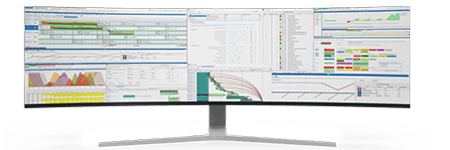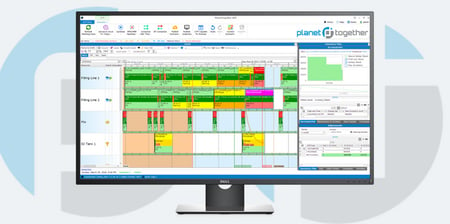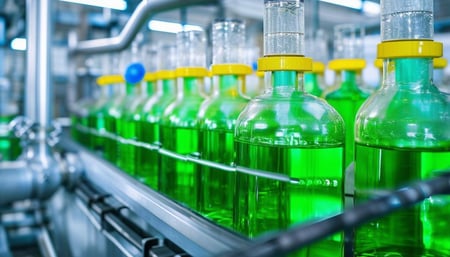The Growing Need for Sustainable Manufacturing in Chemical Manufacturing
The chemical manufacturing sector faces increasing pressure to adopt sustainable practices. This push for sustainability isn’t just driven by environmental concerns; it is also about meeting consumer expectations, regulatory compliance, and improving operational efficiency. For an Operations Director in a chemical manufacturing facility, implementing sustainable manufacturing is more than a trend—it’s a strategic imperative. To achieve this, advanced planning and scheduling software like PlanetTogether, integrated with leading ERP and supply chain management platforms such as SAP, Oracle, Microsoft, Kinaxis, and Aveva, can provide essential insights and enable streamlined, sustainable processes.

The Sustainability Imperative in Chemical Manufacturing
Chemical manufacturing has one of the largest environmental footprints in industrial production. From high energy consumption to emissions and waste generation, the sector contributes significantly to environmental challenges. This intensifies the need for manufacturers to adopt sustainable practices not only for regulatory compliance but also to align with the global shift toward greener solutions. Today’s consumers and regulators are prioritizing eco-friendly products, and industries are increasingly required to demonstrate a commitment to sustainability.
For Operations Directors, the journey toward sustainability includes reducing waste, optimizing energy consumption, and minimizing greenhouse gas emissions. Meeting these objectives demands visibility across the supply chain, efficient resource utilization, and a strategic approach to production planning.
![]()

Enhancing Sustainability Through Advanced Software Integrations
Incorporating sustainable practices into daily operations necessitates more than isolated changes. It requires a holistic approach, where each part of the manufacturing process is scrutinized for opportunities to reduce waste, optimize resources, and cut emissions. This is where integrating advanced scheduling and planning tools like PlanetTogether with ERP systems such as SAP, Oracle, Microsoft, Kinaxis, and Aveva becomes invaluable.
These integrations can support sustainable manufacturing in several ways:
Enhanced Resource Planning and Optimization: By leveraging data from ERP systems, PlanetTogether can help operations teams analyze resource usage, production schedules, and inventory levels, ensuring minimal waste and optimized resource allocation.
Efficient Energy Management: Through detailed insights into production timelines and requirements, Operations Directors can better manage energy-intensive processes, scheduling them during off-peak times or consolidating batches to reduce energy costs and emissions.
Reduced Waste and Emissions: Real-time data from connected systems allows for quick adjustments in production, reducing raw material waste and emissions associated with overproduction or inefficient processes.

Key Benefits of PlanetTogether Integration for Sustainable Operations
PlanetTogether’s scheduling and planning solutions, when integrated with SAP, Oracle, Microsoft, Kinaxis, or Aveva, enable chemical manufacturers to enhance sustainable practices. Here’s how:
Streamlined Production Schedules for Efficiency
One of the most impactful ways to achieve sustainability is through optimized production scheduling. Integrated with an ERP system, PlanetTogether provides real-time visibility into production timelines and resource requirements. For instance, if SAP is the ERP backbone, the integration allows operations managers to adjust schedules based on live data, optimizing production runs to reduce downtime and energy consumption.
Efficient scheduling can lead to reduced operational hours for equipment, minimizing wear and tear and lowering energy use. For a chemical facility, this could mean consolidating production batches to reduce heating, cooling, or other high-energy processes, thus lowering both costs and emissions.
Inventory and Supply Chain Synchronization
PlanetTogether’s integration with ERP platforms facilitates precise inventory management, which is essential for sustainability. When connected to Oracle or Kinaxis, for example, PlanetTogether can improve raw material utilization by offering real-time visibility into stock levels, demand forecasts, and production requirements.
An Operations Director can use this visibility to synchronize supply and demand better, reducing the risk of overproduction and minimizing the disposal of expired chemicals. This integration ensures that materials are used before expiration and that waste is minimized. Additionally, by understanding inventory needs in advance, facilities can order materials in more efficient quantities, reducing transportation costs and emissions associated with frequent deliveries.
Carbon Footprint Tracking and Reporting
Chemical manufacturing operations are frequently under scrutiny for their carbon footprint. Integrating PlanetTogether with Aveva’s data and visualization capabilities can provide Operations Directors with insights into carbon emissions and other environmental metrics. By combining scheduling data with energy usage patterns, the integration can help identify high-impact areas where emissions can be minimized.
Tracking and reporting carbon footprint data is increasingly essential for meeting regulatory standards and demonstrating a commitment to sustainability to stakeholders. Such data also allows chemical manufacturers to set actionable sustainability goals and monitor progress, positioning the company as a leader in eco-friendly manufacturing practices.

Overcoming Common Barriers to Sustainable Manufacturing with Integrated Systems
Despite the clear advantages, implementing sustainable practices in chemical manufacturing can face hurdles. Here’s how integrations can help address these barriers:
Resource Constraints
Sustainable manufacturing often requires additional resources, which may seem costly initially. By integrating PlanetTogether with ERP systems like Microsoft Dynamics, chemical manufacturers can optimize resource allocation, ensuring every dollar spent on sustainable initiatives yields maximum returns. For example, PlanetTogether can simulate different production scenarios, helping Operations Directors choose the most cost-effective and sustainable approach.
Data Silos and Lack of Transparency
Siloed information is a common issue in complex manufacturing operations, making it challenging to achieve sustainability goals. Integrating PlanetTogether with ERPs such as SAP or Oracle breaks down these silos, providing a single source of truth for production data. This transparency allows Operations Directors to make informed decisions that align with sustainability targets.
Difficulty in Measuring Impact
Many manufacturers struggle to quantify the impact of sustainable initiatives. Integrating PlanetTogether with Aveva’s analytics tools, for instance, offers visibility into key performance indicators (KPIs) around sustainability, such as energy consumption, material waste, and emissions reductions. This integration enables Operations Directors to accurately measure progress and make data-driven adjustments to meet sustainability objectives.
The Path Forward: Building a Sustainable Future
For Operations Directors, integrating PlanetTogether with ERP and supply chain management platforms represents an actionable path to achieving sustainable manufacturing goals. Beyond meeting regulatory requirements, sustainable practices can provide a competitive advantage, reduce costs, and improve the organization’s reputation among consumers and partners.
Achieving sustainability is not a one-time effort; it’s an ongoing journey that requires continuous adaptation to technological advancements and changing environmental standards. By embracing these integrations and leveraging the data they provide, chemical manufacturers can develop agile, eco-friendly processes that are both profitable and sustainable.
The path to sustainability in chemical manufacturing is complex, but advanced integrations between PlanetTogether and ERP systems such as SAP, Oracle, Microsoft, Kinaxis, and Aveva make it achievable. These integrations allow Operations Directors to optimize production, reduce waste, and track carbon footprints effectively, helping chemical manufacturers respond to both internal and external pressures for sustainable practices.
By investing in these advanced, integrated technologies, chemical manufacturers can position themselves as leaders in sustainability, driving positive environmental impact while enhancing operational efficiency. Sustainable manufacturing is not just a choice; it’s a business imperative that will define the future of the chemical industry.
Are you ready to take your manufacturing operations to the next level? Contact us today to learn more about how PlanetTogether and integrated scheduling solutions can help you achieve your sustainability goals and drive success.
Topics: PlanetTogether Software, Integrating PlanetTogether, Chemical Manufacturing, Reduced Waste and Emissions, Enhanced Resource Planning and Optimization, Efficient Energy Management, Inventory and Supply Chain Synchronization, Streamlined Production Schedules for Efficiency, Carbon Footprint Tracking and Reporting





















LEAVE A COMMENT